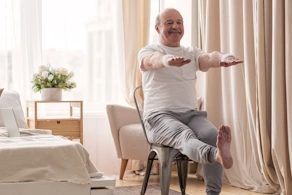Subtle Signs of Depression in Seniors: What Might Be Overlooked
Our Key Takeaway
Depression in seniors often shows up in less obvious ways, such as irritability, negative thinking, trouble concentrating, mood swings, or constant guilt. Recognizing these subtle signs early can lead to greater understanding, outreach, support, and help before issues worsen.
Major depression is under-recognized in seniors because its symptoms are frequently attributed to age-related changes involving the aging brain.
Compared to younger people, the elderly will infrequently portray the common symptoms of depression as sadness or lack of enthusiasm in their day-to-day activities. Rather, their depression may not be as severe, nor obvious, and thus can be easily ignored or dismissed easily.
It is therefore very important for one to be able to identify such less conspicuous symptoms to ensure that one is well-treated and supported as early as possible.
This article delves into some of the signs of depression in seniors that are not very evident that show that a senior person is depressed, thus enabling families or those close to the patient to notice that they require assistance.
Life Assure Product Quiz
Take our 30 second quiz and discover which Life Assure medical alert device is the right fit for you or a loved ones.
Life Assure Product Quiz
Take our 30 second quiz and discover which Life Assure medical alert device is the right fit for you or a loved ones.
An Insight Into Recognizing the Subtle Signs of Depression In Seniors

Here are the subtle signs of depression you should look for in seniors.
Negative Bias
Depression among the elderly can be evidenced by negative judgment, for instance, abnormalities of interpretation of them, in that they hold a pessimistic view towards conditions and circumstances around them.
This can range from concentrating on the worst events in one’s life while at the same time ignoring all the good experiences.
Each of these comes under the category of negative bias and includes complaining all the time, relapsing on past regrets, and being pessimistic about the future.
While it could easily be passed off as pessimism or your typical ‘I am in a bad mood today’ attitude, it may mean a lot more; depression.
Extreme Irritability
The elderly people especially the women may be easily irritated, this being another sign of depression. Irritability, on the other hand, is different from what people experience during sadness which primarily defines the symptoms of depression.
Such an increase in the sensitivity to these things may lead to the worsening of situations and can be easily attributed to changes in one’s personality because of the age factor or some stress factors present in the latter’s life.
However, mere irritability is rather common and if the elderly person manifests such a behavior for several days on end, then it may be an indication of depression.
Concentration Issues
Depression among senile/palliative patients may lead to inability to concentrate leading to likely forgetfulness. This could result in frustration, reduced efficiency in their productivity, and drop out from engaging activities they used to undertake.
These cognitive difficulties are sometimes confused with being considered to be a part of age-related changes or first manifestations of dementia but can also be related to depression.
Cognitive impairments of depressed elderly may manifest in problems with concentration, which may include, hesitancy in decision-making, inability to follow discussions, or persistent forgetfulness.
Toggling
There may be constant changes in moods without any actual cause which is a pointer to depression among seniors. This behavior may include the patient's shift between happiness, sadness, irritability, and apathy scales in a short period.
This causes one to become moody or even volatile in their behavior switching from one side to the other, this can be bewildering especially to the people close to the affected individual.
Although the subject may switch from one feeling to another in quick succession, there might be a deeper underlying reason for the subject’s depression. Identifying toggling as a sign of depression will assist in early detection but requires a trip to the mental health professional.
Excessive Drinking
Alcohol consumption is another red flag that indicates depression in senior citizens; especially if a senior has been observed to be disinhibited or drinking large quantities of alcohol instead of the normal occasional glass of wine or a beer in the evenings.
Such signs of depression in seniors may be especially risky, as it is associated with the worsening of depressive symptoms and the development of other diseases: liver diseases and falls.
Seniors are often involved in drinking beyond moderation, and the cases are usually explained as the senior going out for drinks or engaging in drunkenness due to boredom.
Perfectionism
Unreasonable demands on oneself in seniors, vulnerability, and fear of making a mistake may point to depression since the personalities of these people are characterized by obsession.
This behavior might be a result of low self-esteem or fear of not being able to complete a task which in turn has depressive thoughts attached to it. This can make the seniors fuss over trifles, or become overly critical, and criticize themselves, as well as others.
Excessive self-criticism is essentially a form of stress with depression accompanying it and social isolation because activities that could be potentially stained or flawed are avoided.
Feeling of Guilt
In seniors, one can also feel guilty almost constantly and this is yet another quite unobtrusive symptom of depression.
This may manifest in an individual as persistent self-criticism with the reactions of guilt for past misdeeds or worthlessness, or in an individual’s deep feeling of obligation for the welfare of others.
Unlike a feeling of regret that one might experience from time to time this type of guilt is irrational and constant and has little to do with reality. This guilt may manifest itself in a senior’s ability to apologize for something when there is no legitimate reason to and says sorry too often.
Further, it is important to be aware of this symptom as a possibility of depression so that they can help in the right manner.
Practices To Adopt If You Have Subtle Signs of Depression

If you experience some of these signs of depression in yourself, it; therefore, implies that you should do all you can to manage your health. Starting with them, one should open up to a person of their choice and describe depressive moods, which helps relieve tension.
Climbing stairs, walking for a few minutes, and doing simple stretches like yoga can help you feel happier and less stressed. It is beneficial to collaborate with other people, no matter if such interaction makes one feel anxious, as it reduces loneliness.
Also, physical health is very important and is characterized by the consumption of healthy and nutritional meals and adequate sleep. For such signs to persist, they may warrant professional intervention by a qualified healthcare provider.
Final Thoughts
In seniors, depression tends to present less obvious symptoms; therefore, people sometimes may not even notice them. Thus, recognizing the signs of depression in seniors helps you take further steps to treat the root causes of mental disorders.












 Get Help With The Push Of
A Button
Get Help With The Push Of
A Button















